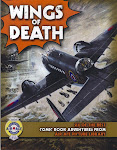I've spent another week sorting through boxes, putting all sorts of oddments up on Ebay, and taking plenty of trips down memory lane. There are a bunch of things I'm hoping to turn up during this late Spring Clean, including some books I've not seen since we moved, some A4 photocopies I did many years ago relating to British comics, and a few other things I occasionally wonder about... mostly I wonder where they are and why I haven't seen them for ten years.
One such thing has turned up as of Wednesday, when I opened a box and found it filled with random paperwork, but also a stack of old photographs. Most of them date from the early 1980s, but there are also a few family photos that are older and some that are later. I didn't own a camera for many years, so the photographic record of my past is patchy for most of the nineties and noughties, up to when I got my first digital camera in 2007.
I'll not bore you with endless photos unless they're relevant, but I do want to post something else that I found that will probably be of interest to nobody. A couple of columns back I mentioned that I grew up on the New Wave of British Heavy Metal through the pages of Sounds and Kerrang! magazine. My gigging days were the late 1970s and early 1980s, curtailed somewhat when many of my friends disappeared off to university and then by the patchy living I was making as a writer. Going to see bands was a luxury that fell by the wayside.
One of the best things about Sounds was the occasional 'Rock Family Tree' by Pete Frame. A 'Rock Family Tree' was a history of a band, its predecessors and offshoots, structured like a family tree with tightly written panels of information about what the band did, who was in the band, their recording history, and anything else that could be squeezed in to give the band context.
Apparently, Frame drew his first tree in 1971, charting the musical lineage of Al Cooper, of Blood, Sweat & Tears fame. This was published in ZigZag magazine and he went on to draw trees for Sounds, NME, Melody Maker, Rolling Stone and for various album sleeves and inserts. I have a Dio family tree that must have come with one of Ronnie James Dio's albums (maybe the live album Intermission?) and I've just read a blog post that mentions a UFO family tree in that band's Anthology album.
Inspired by the trees I was seeing in Sounds, I had made my own attempt at a family tree covering some of my own favourite bands: UFO, Scorpions, Black Sabbath, and Rainbow. I included quotes from interviews from Sounds and Kerrang! and painstakingly compiled lists of album catalogue numbers, just as Frame did. I threw in some spelling mistakes and grammatical glitches, which Frame avoided, and – after three days intensive work in March 1981 – stuck together the resulting 16 sheets into one massive poster.
When I found it on Wednesday, the paper had turned yellow and the Sellotape had bled through, turning the poster into a ghastly discoloured grid. That it has survived this long is a miracle... and here it is, scanned, photoshopped, the tape stains reduced, although not entirely removed, shrunk down, but hopefully still readable...
Pete Frame did a family tree for UFO eighteen months later, and it was included in his Rock Family Trees Volume 2. You'll see that he chose a different route, but it covered a lot of the same ground. Who's to say which is the better of the two.
Me. I'm saying that his is better, by far. Makes mine look like it was drawn by an 18-year-old hospital cleaner.
I drew a few more of these family trees over the next year or two, but nothing of the same complexity or size. The UFO "poster" was 100 x 75 cm and the only thing I've done that comes close to that was a family tree that I drew up poster-size for my Mum a couple of Christmases ago. The little family trees I drew for the Iron Mask book also owe a debt to those old Rock Family Trees.
Incidentally, Pete Frame has made over 140 of his trees available as prints. The website [SADLY NOW GONE] allows you to browse by tree, so you can see a lot of examples. The TV show that came out in 1995, with a second series three years later, sometimes turns up on BBC4 and they're worth catching if you spot them in the TV listings.
The photo at the top of the column was taken at Reading Festival on 27 August 1983. The band on stage are Anvil, a Canadian rock band who were the subject of the documentary Anvil: The Story of Anvil. I'm not kidding when I say that it was the last movie that made me cry. It's an amazing story of a band that almost made it big. They had one hit album and played a major festival gig in Japan that was probably the highlight of their career. The film follows the band, its members now in regular jobs but still occasionally gigging, and the preparations for a planned European tour. Everything that can go wrong does go wrong, but the band try to make another album (their thirteenth) by borrowing money, and then have an opportunity to return to Japan.
It will break your heart and then rebuild it, riff by riff.
Here are the Rock Family Trees family of books.
Friday, May 31, 2019
Subscribe to:
Post Comments (Atom)






























































No comments:
Post a Comment